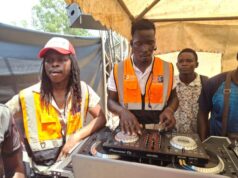Ms Grace Wambui had not chosen agriculture as her initial career choice. She ended up here by coincidence. She began a modest company selling motorcycle components after school and ran a mobile money kiosk at Nakuru’s booming Kiambogo Shopping Centre.
Getting into agriculture happened by coincidence when she met Florence Malemba, an extension officer in her neighbourhood, and they started discussing various agri-business prospects for youngsters.
“Thanks to Florence, I’m currently working in agriculture.” I have a spare parts store, a mobile money company (I have a Mpesa shop), and I am also a bean farmer. I’ve been leasing land for this purpose since last year, and I have no plans to quit anytime soon.
What drives me to grow beans is that it just takes 2-3 months to produce the beans and you are ready to harvest and sell them, unlike maize or wheat, which takes longer.” She explained.
She planted one acre of native beans, Mwitemania, last year amid the limited rains. She planted 30 kilograms and collected 450 kg (that is 5 bags of 90kg). At the time, the yields were quite poor. She didn’t give up hope, though, because it was a new and supplemental source of money. She sought advice from Florence, who works for the Ministry of Agriculture, on which type would best fit her field and provide her with the most production and revenue.
Florence showed her around her bean farm, where she grows Nyota Beans, which are high in iron and zinc. She was so taken aback by the farm’s yield that she asked Florence to sell her some seeds for the coming season. Grace purchased 30kg of Nyota seed from Florence in January 2020 in anticipation of the April rains.
“This is where the money is,” says the narrator. My yield nearly doubled after switching varieties! 720 kg of beans were gathered.” She explained.
Florence suggested a location where she could sell her beans quickly. There are various intermediaries who, like other companies, might take advantage of farmers by providing them with poor pricing.
Grace was introduced to Smart Logistics Ltd, a bean processing company that was interested in purchasing Grace’s beans. Bean flour, pre-cooked beans, noodles, and other items are produced by the processor.
“I made USD$ 420 by selling my 6 bags (540 kilos) of beans for US$ 70 each (Ksh.7000) to Smart Logistics Ltd. (Ksh. 42,000) I’ve set aside 180kg for consumption and some for seed next season. Grace beams, “I’m even contemplating leasing extra property for my next planting.”
She intends to increase the bean field from one acre to two acres for the approaching brief rains in September. Following a brief tutorial on bean crop management from the extension worker, she hopes to produce 10-12 bags per acre.
She intends to reinvest the proceeds from the bean growing into her two other enterprises and hire an additional employee to assist her in running them, especially when things become hectic, such as during planting and harvesting, which require constant supervision.
Global Affairs Canada (GAC), the International Development Research Centre (IDRC), the Australian Centre for International Agricultural Research (ACIAR), and the Swiss Agency for Development and Cooperation have all contributed to this initiative (SDC).







